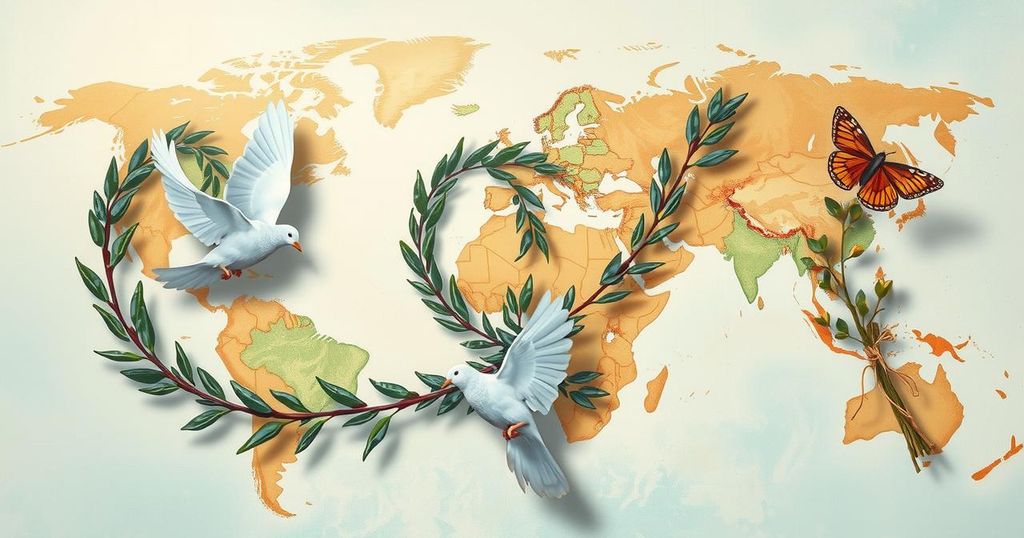Trump and Rubio Secure Rwanda-Congo Peace Treaty Amid Pakistan’s Nobel Nomination
President Trump has announced a peace treaty between Rwanda and Congo, while Pakistan has nominated him for the 2026 Nobel Peace Prize. Trump expressed skepticism about winning the award despite his diplomatic efforts. The announcement sparked a backlash from India, which refuted claims of U.S. mediation in the India-Pakistan crisis. The nomination process for the Nobel Prize is ongoing until January 31.
On Friday, President Donald Trump announced the successful arrangement of a peace treaty between Rwanda and the Democratic Republic of Congo, something he described as “wonderful.” This news comes amid Trump’s formal nomination by Pakistan for the 2026 Nobel Peace Prize. In a post on Truth Social, he detailed the decades-long conflict that plagued the region, referring to it as one marked by significant violence and loss of life.
Trump indicated that representatives from both nations would be visiting Washington on Monday to finalize the treaty signing. The president’s remarks emphasized the importance of this development, proclaiming it a beneficial moment not just for Africa but for the entire world. However, he quickly shifted the tone to his rather grim outlook on winning a Nobel Peace Prize, stating that he believes his efforts might go unrecognized.
The president expressed skepticism about receiving the prestigious award by listing numerous peace efforts he feels are overlooked, including those related to India and Pakistan, as well as the complexities involving Israel and Iran. Trump noted, “I won’t get a Nobel Peace Prize for this, I won’t get a Nobel Peace Prize for stopping the War between India and Pakistan…” insisting that public acknowledgment is what truly matters.
The backlash from India was swift after Trump’s claims about mediating the Pakistan-India tensions. Indian officials, particularly Foreign Secretary Vikram Misri, stated that discussions for a ceasefire had transpired directly between India and Pakistan, dismissing the notion of any outside mediation. They reiterated the country’s steadfast position against third-party involvement in their diplomatic matters, emphasizing India’s autonomy in such crises.
As if on cue with Trump’s alarming announcements, Pakistan’s government took to X, officially celebrating Trump’s nomination for the Nobel Peace Prize for his purported leadership during the recent tensions with India. In an extensive post, they underscored his role in managing what they cited as acts of aggression from India and referred to his diplomatic interventions as marks of proactive statesmanship.
Additionally, the Pakistani government praised Trump’s assistance in brokering peace during the 2025 crisis, framing him as a significant peacemaker committed to dialogue, citing his willingness to help resolve the long-standing Jammu and Kashmir dispute. They see his efforts as essential for stabilizing not just the region but potentially broader international practices amidst various conflicts, including issues facing the Middle East.
It is vital to note that the nomination for the Nobel Peace Prize is highly selective, requiring endorsement from qualified individuals or entities such as governments or previous laureates. Nominations are submitted confidentially and must be completed by January 31, which explains why discussions for the 2026 nomination are underway now.
In summary, President Trump’s announcement of a peace treaty between Rwanda and Congo, coupled with a formal nomination from Pakistan for the 2026 Nobel Peace Prize, showcases a web of diplomatic actions and official recognitions. While Trump’s focus on his own Nobel candidacy invites skepticism, the international response—especially from India—hints at a contentious atmosphere surrounding these geopolitical maneuvers. As the nomination process unfolds, the implications of these developments will likely resonate in global diplomatic circles for some time to come.
Original Source: www.foxnews.com




Post Comment